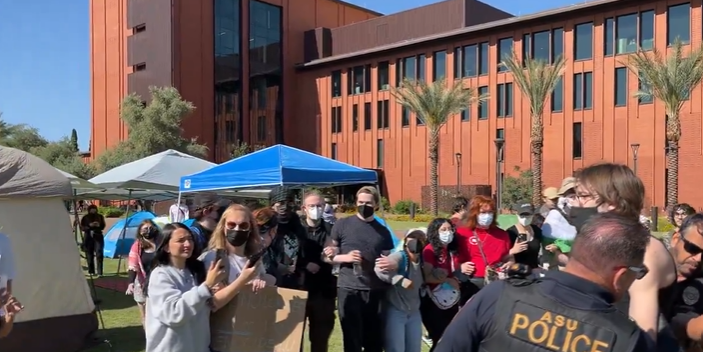
by Staff Reporter | Apr 28, 2024 | Education, News
By Staff Reporter |
A University of Arizona assistant professor who moonlights as a drag queen, Harris Kornstein, pushed children to support Hamas during a recent drag story hour with Valley Families for Palestine, arranged by Queer Storytime for Palestine.
Kornstein encouraged the crowd of children to chant “Free Palestine!” as a response to: “If you’re a drag queen and you know it…” during a performance this week.
Palestinians don’t tolerate LGBTQ+ individuals, especially Hamas. Anyone involved in those lifestyles in the area risks persecution and violence at minimum, even death.
Valley Families for Palestine, an activist coalition located in the Connecticut River Valley, privatized their social media accounts after Kornstein’s video went viral.
Also involved in the drag story hour were Sarah Prager, an LGBTQ+ author; Hannah Moushabeck, a queer author and Palestinian supporter; Jewish Voice for Peace Western Mass; Booklink Books; MassEquality; Parasol Patrol at Western Mass; and Western Mass Mask Bloc.
Kornstein, who goes by the drag name “Lil Miss Hot Mess,” often does his drag performances for minors in other states in addition to drag story hours.
Kornstein is also a board member for Drag Queen Story Hour, and author of two books marketed to children normalizing drag lifestyles: “The Hips on the Drag Queen Go Swish, Swish, Swish,” and “If You’re a Drag Queen and You Know It.”
Drag Queen Story Hour is a national organization with state chapters that emerged from Michelle Tea, a leftist author from San Francisco who launched it out of her desire almost 10 years ago to raise her toddler in “queer culture.”
In a 2021 research paper, Kornstein defended the creation of Drag Queen Story Hour as a means of allowing children to explore “queer pedagogy” and engage in “queer imagination” from a young age. The latter term, Kornstein said, enhanced child development through play as praxis, aesthetic transformation, strategic defiance, destigmatization of shame, and embodied kinship. Kornstein noted that drag queen engagement with children would lead to normalization of the practice.
“Within this complex political landscape, [Drag Queen Story Hour] seems to uniquely thread the needle between queer activism and broad cultural acceptance,” said Kornstein.
At the University of Arizona, Kornstein taught in the College of Humanities Public & Applied Humanities. Up until he went on research leave last year, Kornstein served as an assistant professor for the Institute for LGBTQ+ Studies, School of Art, School of Information, and Graduate Interdisciplinary Program in Social, Cultural, and Critical Theory.
Kornstein was able to go on leave thanks to a $60,000 grant from the Biden administration’s National Endowment for the Humanities. That funding is going toward a book project theorizing queer and transgender strategies of countering “surveillance capitalism” through observations of drag queens, transgender taxi drivers, cruising gay men, witchcraft, “mystical intuition,” and “gay hanky codes.”
Last December, the University of Arizona awarded Kornstein the Chatfield Impact Award — an honor for exemplary teaching, research, and service — for which he received $5,000.
Kornstein auctioned his books for a “Books for Palestine” fundraiser last November.
AZ Free News is your #1 source for Arizona news and politics. You can send us news tips using this link.

by Elizabeth Troutman | Apr 28, 2024 | Education, News
By Elizabeth Troutman |
Almost 30,000 students will graduate from Grand Canyon University later this month, marking the third time the school has produced this many alumni in a year.
“We are blessed to be able to celebrate the accomplishments of another record class of graduates who are meeting the needs of today’s workforce and fulfilling their purpose as servant leaders throughout the world,” GCU President Brian Mueller said in a statement.
On April 25-26, GCU will hold commencement ceremonies for 5,388 traditional students on the Phoenix campus, while the 23,597 graduating online students will have commencement May 1-3. The total number of students in the graduating class is 28,985, including those who completed their degrees in Summer 2023, Fall 2023, and projected graduates from Spring 2024.
In the 2022-23 year, 29,116 students graduated, while 30,000 graduated in the 2021-22 year.
“While enrollment numbers and graduation numbers are declining nationwide, we have continued to produce a significant number of graduates who are impacting industries throughout the country,” Mueller said.
Of all graduates, 15,580 completed their undergraduate degree, and 13,405 were graduate students earning master’s or doctoral degrees.
The Honors College had 682 graduates, raising the total to more than 2,500 since the college started in 2013.
In the 2023-24 academic year, enrollment at GCU surpassed 25,000 on the Phoenix campus, with another more than 92,000 studying online. Additionally, GCU grew from nine to 10 colleges when the College of Science, Engineering and Technology split into two, forming the College of Engineering and Technology and the College of Natural Sciences.
GCU also opened a physical location for its Grand Canyon Theological Seminary in the fall. The 17,000-square-foot Seminary offers GCU’s Master of Divinity program and provides a meeting space for local pastors.
The Phoenix-based university also created the Center for Workforce Development and added two more Accelerated Bachelor of Science in Nursing program sites, bringing the total number of sites to six. GCU is on track to open three more sites in the 2024-25 academic year.
Mueller attributed the growth to students, faculty, and above all, God.
“That is a testament to the extraordinary power of education when delivered creatively across multiple platforms and taught from a Christian worldview perspective,” Mueller said. “It is also a reflection of both our outstanding students and the support they receive from our faculty and staff.”
Elizabeth Troutman is a reporter for AZ Free News. You can send her news tips using this link.

by Elizabeth Troutman | Apr 27, 2024 | Education, News
By Elizabeth Troutman |
Students at Arizona State University reportedly held anti-Israel demonstrations on campus Friday.
Videos shared by local free speech advocate Ann Atkinson on X show students yelling “Free, Free, Free Palestine” on the Old Main Lawn, which was covered in tents, signs, and protesters.
Arizona State police handcuffed multiple people amid the protest. Protesters started to form a group in front of Old Main near College Avenue and University Drive on the ASU campus around 9 a.m.
ASU prohibits encampments on property that are outside of university-sanctioned activity.
“Individuals found setting up unapproved encampments will be directed to dismantle them immediately,” an ASU spokesperson told ABC15. “Failure to comply may result in being trespassed from campus and possible arrest. We prioritize the safety and well-being of the campus community and uphold policies to ensure a welcoming environment for everyone.
When police first approached the scene Friday morning and ordered the students to stop protesting, demonstrators chanted, “Hey Hey, ho ho, those damn pigs have got to go.”
Arizona State University joined various universities and other academic groups in issuing a statement in support of Israel in October following the initial Hamas attack, which killed around 1,200 Israelis and foreigners.
“We are horrified and sickened by the brutality and inhumanity of Hamas,” the statement read.
The protestors issued a list of demands asking the university to change its pro-Israel stance.
Demands included asking ASU to issue an official statement condemning the zionist genocide of Palestinians; disclosing all investments made with student money; divesting from companies tied to Israel or complicit in the occupation of Gaza; ending partnerships with groups tied to Israel; providing amnesty for students and faculty disciplined for supporting Palestine; and ending investigations on pro-Palestinian groups.
The protestors demanded that ASU President Michael Crow immediately resign and called for the ASU police to be abolished.
Atkinson suggested that protesters may have wanted to clash with the police.
“Current reporting indicates the protesters did not follow basic rules and are being accused of trespassing,” she said on X. “You would think organizers of a protest like this, which is supported by some ASU faculty and community organizers, and is also set up across the street from the university presidents office, would be smart enough to follow the rules. Perhaps their objective was a conflict with police.”
ASU is one of many schools to face unlawful anti-Israel protests from students.
More than 100 students were arrested last Thursday at Columbia University. Since then hundreds of students have set up similar encampments from California to Massachusetts.
Students at the University of North Carolina at Chapel Hill organized tents, tarps, and air mattresses in a central courtyard, while students at the Fashion Institute of Technology in Manhattan set up an encampment Thursday inside the college’s Goldman Center.
Police arrested 36 people Thursday night when hundreds of Ohio State University students, faculty, and community members set up tents outside the student union. Almost 60 were arrested after protests at the University of Texas.
Elizabeth Troutman is a reporter for AZ Free News. You can send her news tips using this link.

by Daniel Stefanski | Apr 26, 2024 | News
By Daniel Stefanski |
Arizona government officials are taking action against organized retail theft in their state.
Earlier this month, Governor Katie Hobbs signed SB 1411, which “creates the Organized Retail Theft Task Force to combat organized retail theft by collaborating with law enforcement agencies, investigating cases of organized retail theft and making recommendation for legislative action to combat retail theft” – according to the overview from the Arizona House of Representatives.
The bill’s sponsor, Senator David Gowan, cheered on the signing of his proposal, writing, “Just last week, three people were arrested for a retail theft spree across Phoenix and Tucson that totaled around $500,000 in stolen merchandise. This type of criminal activity is on the rise, especially in Democrat-controlled states with soft on crime attitudes, and we must create laws to help law enforcement crack down on it. Thankfully, my bill SB 1411, which establishes a task force to combat crimes that relate to stealing, embezzling or obtaining retail merchandise by fraud, false pretenses, or other illegal means for the purposes of reselling the items, was signed into law. The task force will be comprised of federal, state, and local law enforcement, in order to use their combined skills, expertise, and resources more effectively. It will also create a system for law enforcement to work together to fight this criminal activity.
Gowan added, “I’m happy to support our small and large business owners with this measure. Republicans are committed to preventing this nasty trend we’re watching explode in California from exploding in Arizona too.”
SB 1411 “instructs the Attorney General to establish the Organized Retail Theft Task Force to combat crimes related to stealing, embezzling or obtaining retail merchandise by fraud, false pretenses or other illegal means for the purpose of reselling the items.” It also “requires the Attorney General to invite federal, state and local law enforcement personnel to participate in the Task Force to enhance the efficiency of law enforcement agencies.”
In March, the State Senate overwhelmingly passed the legislation with a bipartisan 22-4 vote (with four members not voting). After being transmitted across the courtyard at the Arizona Capitol, the bill was approved by the State House with a 43-16 tally (with one vacant seat) earlier this month. Hobbs signed the proposal on April 16.
State Senator Janae Shamp and State Representative Justin Wilmeth, both Republicans, were cosponsors of the bill.
On the Arizona Legislature’s Request to Speak system, representatives from the Arizona Retailers Association, Arizona Attorney General’s Office, Arizona Food Marketing Alliance, National Federation of Independent Business, Greater Phoenix Chamber of Commerce, CVS Health, and Quiktrip endorsed the legislation.
SB 1411 will go into effect 90 days after the Arizona Legislature adjourns for 2024.
Daniel Stefanski is a reporter for AZ Free News. You can send him news tips using this link.

by Daniel Stefanski | Apr 26, 2024 | Education, News
By Daniel Stefanski |
Another legislative solution to protect Arizona women and girls was vetoed by the state’s Democrat governor.
This week, Governor Katie Hobbs vetoed SB 1182, which would have “mandate[d] a public school provide a reasonable accommodation to a person who is unwilling or unable to use a multioccupancy shower room designated for the person’s sex, [and] provide[d] private cause of action to an individual who is denied a reasonable accommodation or who encounters a person of the opposite sex in a public school multioccupancy shower room as specified” – according to the overview from the Arizona House of Representatives.
In her veto letter, Hobbs was brief in her explanation to Senate President Warren Petersen, writing, “As I have said time and time again, I will not sign legislation that attacks Arizonans.”
Senator John Kavanagh, the bill’s sponsor, was irate about the governor’s action. He stated, “Girls should not be forced to shower with boys in our taxpayer-funded public schools. It’s utterly disgusting that Democrats, who are out-of-touch with reality, continue to push gender neutrality upon our children, endangering their safety and well-being just to politically platform off a small population they pretend to care about. All students, not just transgender kids, deserve to feel safe and deserve to have privacy when they’re naked in a shower. This was a reasonable bill that a majority of Arizonans agree with.”
The longtime northeast valley lawmaker added, “Unfortunately, because of this partisan driven veto by our Governor, our daughters, granddaughters, nieces, and neighbors will continue to be subjected to not only embarrassment, but sexual assaults and harassment in the event a boy who’s claiming to be a girl is allowed into their female-only showers. I encourage Arizona parents, women, and girls to reach out to the Governor and our Democrat state lawmakers and demand they respect their privacy rights. Change will only happen if we continue to speak out and push back against these injustices our women and girls continue to endure at the hands of Arizona Democrats.”
When the legislation was considered before the full Senate chamber in February, it passed along partisan lines, 16-13 (with one member not voting). After the proposal was transmitted to the House, it was approved 31-28 (with one vacancy) earlier this month – also along partisan lines. Since it was amended in the House, the bill made its way back over to the Senate for concurrence, receiving a 16-14 green light.
On the Arizona Legislature’s Request to Speak system, a representative from the Center for Arizona Policy endorsed the legislation. Representatives from Stand for Children, Arizona Education Association, American Civil Liberties Union of Arizona, Save Our Schools Arizona, Arizona School Boards Association, Arizona Center for Women’s Advancement, NARAL Pro-Choice America, National Council of Jewish Women Arizona, Children’s Action Alliance, Planned Parenthood Advocates of Arizona, Stonewall Democrats of Arizona, the City of Tucson, and Human Rights Campaign, signed in to oppose the bill.
Daniel Stefanski is a reporter for AZ Free News. You can send him news tips using this link.

by Daniel Stefanski | Apr 26, 2024 | News
By Daniel Stefanski |
An Arizona Legislative Republican solution to assist homebuilding in the state was signed into law.
Earlier this week, Governor Katie Hobbs signed SB 1162, which “establishes requirements relating to zoning ordinances and a housing needs assessment” – per the overview from the Arizona House of Representatives.
According to the press release from the Arizona State Senate Republicans, the legislation “cuts the unnecessary government red tape, responsible for prolonging approvals on zoning applications needed for home construction to begin, by requiring local governments adhere to reasonable timelines to help expedite the homebuilding process in an effort to increase supply and lower prices.” It would also require “cities and towns to conduct and publish a housing needs study every five years to proactively assess current and anticipated demand for homes in order to swiftly respond to housing shortages.”
Senator Janae Shamp, the bill’s sponsor, cheered on the success of her proposal, writing, “Every hardworking citizen within the state of Arizona should be able to afford a home in a safe community. Unfortunately, the American dream of homeownership has become unattainable for many Arizonans over the past five years because of increased demand combined with irresponsible actions from local governments. Republicans at the Arizona Legislature are committed to solving Arizona’s housing shortage crisis, and this is just a small piece of the puzzle. Government helped create this problem, and we will continue to craft policy getting government out of the way so the free market can respond to our citizens’ needs.”
Shamp thanked one of her legislative partners in this specific effort and promised more action on behalf of Arizonans. She said, “I want to thank Representative Matt Gress for working on this legislation with me, and I look forward to taking additional action with Republican lawmakers to offset the crippling inflation Arizonans are struggling with under the Biden Administration.”
SB 1162 will go into effect 90 days after the Arizona Legislature adjourns for the 2024 session.
Daniel Stefanski is a reporter for AZ Free News. You can send him news tips using this link.






